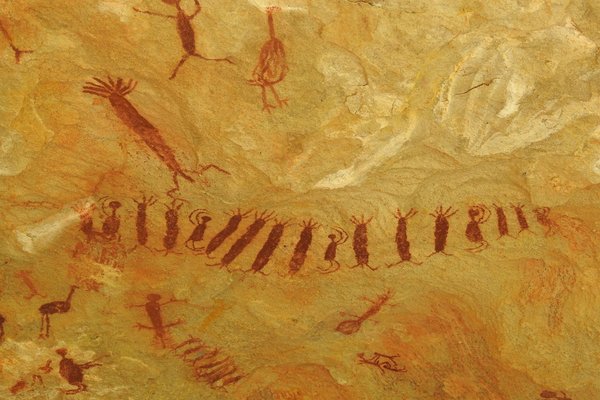Brazil
Serra da Capivara
Serra da Capivara National Park holds many rock shelters in which the oldest rock art of the Americas has been found.
The art and associated archeological sites reveal aspects of the religious beliefs and practices of one of the oldest populations to inhabit South America. The earliest traces of rock painting here may date from 25,000 BP, while most of the painted works are from 10,000 to 4,000 BCE. They were made by Nordeste and Agreste cultures.
Community Perspective: all reviewers so far loved it, and you can easily spend 2-3 days here. The Caatinga landscape of the park, typical of this semi-arid region, is an additional bonus. Be aware that you need a local guide to enter: some contacts can be found in the reviews of Wojciech and Els, or you could ask at your lodgings the night before your visit.
Site Info
Official Information
- Full Name
- Serra da Capivara National Park (ID: 606)
- Country
- Brazil
- Status
-
Inscribed 1991
Site history
History of Serra da Capivara
- 2003: Rejected
- Regarding extension on natural criteria
- 1991: Inscribed
- Inscribed
- Type
- Cultural
- Criteria
- iii
Links
- UNESCO
- whc.unesco.org
- Official
-
- fumdham.org.br — Parque Nacional
- Related
-
- saoraimundo.com — Sao Raimundo Tourism has practical visitor info
- bradshawfoundation.com — Bradshaw Foundation on the Rock Art of Serra da Capivara
All Links
UNESCO.org
- whc.unesco.org — whc.unesco.org/
Official Website
- fumdham.org.br — Parque Nacional
Related Resources
- saoraimundo.com — Sao Raimundo Tourism has practical visitor info
- bradshawfoundation.com — Bradshaw Foundation on the Rock Art of Serra da Capivara
News Article
- Aug. 24, 2017 theguardian.com — Ranger at Serra da Capivara killed by illegal hunters
- March 31, 2014 ancient-origins.net — Belief about human arrival in the Americas challenged
Community Information
- Community Category
- Archaeological site: Rock Art
Travel Information
Guided Tour Only
Most Remote Cultural WHS
Recent Connections
-
Perfect Inscriptions
1991 -
Most Remote Cultural WHS
There's a minor hub at Sao Raimundo Non… -
Named after a Mountain
"The name of the mountain range that de…
Connections of Serra da Capivara
- Individual People
-
-
Female Archaeologists
Niède Guidon - "a Brazilian archaeologist known for her work in pre-historic archeology of South American civilizations and her efforts to secure the conservation of the World Heritage Site Serra da Capivara National Park."See en.wikipedia.org
-
- Trivia
-
-
Oldest cultural WHS
Some paintings are 25000 years old, so 23000 B.C. (3) -
Largest cultural WHS
130,600 ha
-
- History
-
-
Paleo-Indian
"The site must have been populated by the early men who populated the American continent." Rock art dated 26,000 - 22,000 years B.C. (AB evaluation) -
Pre-Clovis archaeological sites in the Americas
Pedra Furada, Serra da Capivara National Park, includes hundreds of rock paintings dating from circa 12,000 years before present. More importantly, charcoal from very ancient fires and stone shards that may be interpreted as tools found at the location were dated from 48,000 to 32,000 years before present, suggesting the possibility of a human presence tens of thousands of years prior to the arrival of the Clovis people in North America.(wiki)See en.wikipedia.org
-
- Ecology
-
-
Ratites
greater rhea -
Jaguar habitat
-
- Damaged
-
-
Rangers killed by poachers
Ranger killed on 18 August 2017
-
- World Heritage Process
-
-
Extensions on Tentative List
Serra da Capivara National Park and Permanent Preservation Areas : extension into a mixed site, to cover the Caatinga shrubland -
Perfect Inscriptions
1991 -
Inscribed on a single criterion only
iii. to bear a unique or at least exceptional testimony to a cultural tradition or to a civilization which is living or which has disappeared -
Cultural sites rejected for Natural criteria
Rejected in 2003
-
- Human Activity
-
-
Hunter-gatherers
According to studies, the area encompassing the Serra da Capivara National Park was occupied by hunters and gatherers, followed by ceramic-farming societies. (official description) -
Pictographs
"Many of the numerous rock shelters in the Serra da Capivara National Park are decorated with rock paintings, some more than 25,000 years old." (OUV) -
Erotic art
“Possible Zoophilia Themes”: "sexual relations from the anthropomorphic and zoomorphic pictures, where possibly an animal lifts its tail to a man. During the field research, the recurrence of this typeof composition was observed, with erect phalli. If wild animals were submitted to erotic contact with homo sapiens, and they behaved comfortably, without force or resistance, it can show the domestication process of the animals during the sedentarization of the human species that was in progress. The utility of animal control did not only permeate agriculture, farming, and transport but also sexual purposes"See www.academia.edu
-
- WHS on Other Lists
-
-
World Monuments Watch (past)
(1996) -
World Biosphere Reserves
Caatinga (2001)
-
- Timeline
-
-
Late Pleistocene
"oldest traces of rock art in South America; they have been dated to 26,000-22,000 BC" (AB ev)
-
- Science and Technology
-
-
Recently discovered
Several important archaeological sites, including Toca da Tira Peia (2008)See en.wikipedia.org
-
- Visiting conditions
-
-
Guided Tour Only
The park may only be entered with a local, accredited guide -
Most Remote Cultural WHS
There's a minor hub at Sao Raimundo Nonato with hotels, but its airport is not in operation and a real city is a 5h drive away
-
- WHS Names
-
-
Named after a Mountain
"The name of the mountain range that defines the park, "Serra da Capivara," literally means "Capybara Hills" in Portuguese. "(Wiki)
-
News
- theguardian.com 08/24/2017
- Ranger at Serra da Capivara killed…
- ancient-origins.net 03/31/2014
- Belief about human arrival in the …
Community Reviews
Show full reviews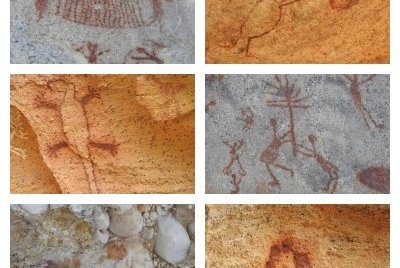
Although Wojciech and Michael already captured the essence of this site excellently after visits as recent as 2019 and 2020, I have a few observations to add after my 1.5-day stay in December 2022. They consider (1) the logistics, (2) the core zone, and (3) the criteria the site was inscribed on.
Logistics. Azul now has direct flights from Recife three times a week to Sao Raimundo Nonato, some 30 km from the main park entrance. Whether this connection is viable is questionable, as the park is mostly visited by school groups arriving by bus. Park admission is free, but you have to hire a local accredited guide beforehand (still 200 B$ a day, when you bring the car) and sign up at the gate. I teamed up with Antoniel (+55 89 8108-8706), by whatsapping him the night before my visit. I came to think of him as my personal trainer, as he walked quite fast and liked to climb (we hiked 8 and 6 km respectively per day). I think he would be happy to take you on one of the more strenuous hikes in the park! But he knows his rock art and birds well also. He only speaks Portuguese.
Core zone. Both the old and new official maps are unhelpful. Important to remember is that the park is huge and has four entrances + some isolated locations around it. The amount of sites and trails is overwhelming (there’s a great book available that …
Keep reading 0 comments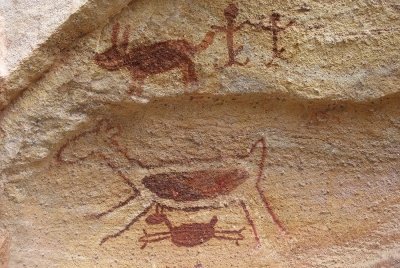
Serra da Capivara is the least visited WHS in Brazil. The reason is the relative inaccessibility of this place - from southern Piaui, where the park is located, everywhere is far away, and the nearest WHS is Sao Francisco Square, about 900 km away. It's best to get to Petrolina by plane (by the way, the name of this place has nothing to do with crude oil), which is about 5 hours away from the park by car (I covered this route in 4 hours in the early morning - but be warned, there are plenty of holes in it).
Me and my family got to the park in November 2020 from Chapada dos Veadeiros, and the 1300-kilometer route took us about 15 hours net with a stop for the night in Barreiras. The road, apart from the last leg in Piaui, is quite nice and very picturesque, especially the first part from Chapada dos Veadeiros do Barreiras. It was absolutely worth the effort - Serra da Capivara is definitely my number one place among the rock art WHS.
In preparation for the trip, I looked at the list of obligatory guides available on the icmbio.gov.br website (currently, however, the site has been unavailable for a long time) and contacted one who was supposed to speak English. It turned out, however, that the declaration of the guide was not true. According to the locals, the only guide who speaks good English is Waltercio Torres Correia - tel./whatsapp + …
Keep reading 0 comments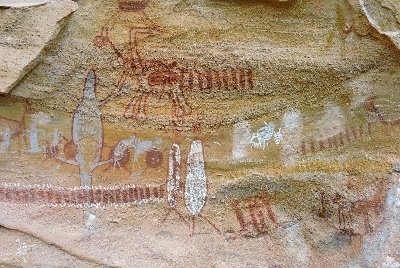
Visit in November 2019
Sites that have been inscribed primarily to protect important areas containing ancient Rock Art are among my favorite types of sites to visit and it had been a fairly long time since I had been to a site from that category. Consequently, I was definitely looking forward to my visit to Serra da Capivara National Park. Though I only had one full day available for this visit, I found the park to be beautiful and fascinating, and felt that my time there was well spent.
As the previous review mentioned, the park is a long way from anywhere else that most travelers might be when visiting Brazil, so getting to the area will generally be time consuming. The transport infrastructure is in reasonably good condition coming from any direction, but, while the small cities and towns that one will pass through along the way are friendly, and contain most of the important services, they are usually not the most attractive examples to be found in Brazil. One of the nicer places is São Raimundo Nonato, the main service center for the park, located just to its south. I used that town as my base for this visit, but there is also a small hotel with a restaurant in the park, adjacent to the main entrance, just to the west of the village of Coronel José Dias. If my timing had been a little different, or if I was able to spend more than one …
Keep reading 0 comments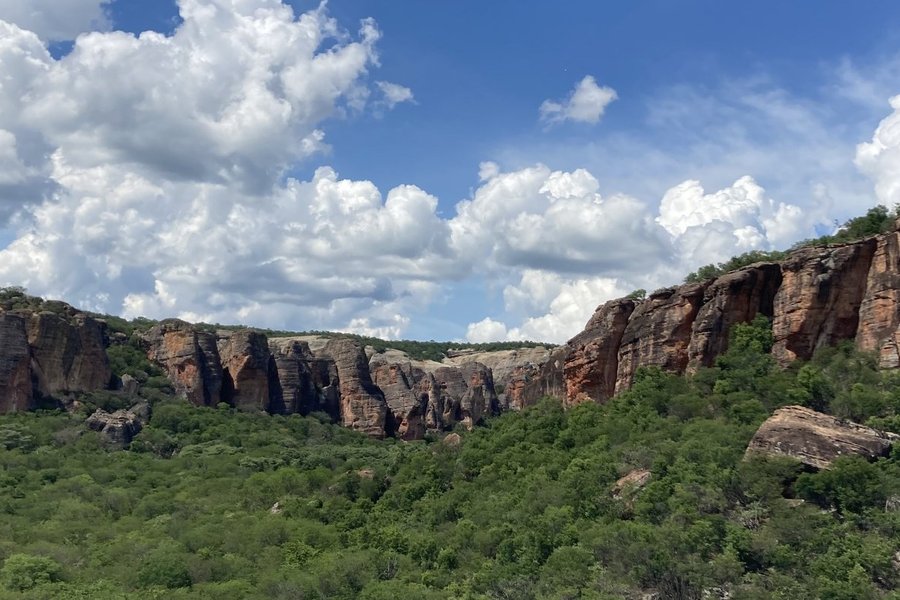
I visited Serra da Capivara NP some months ago. Truly an amazing experience. It takes time and planning to get there, as the closest airport is 400 km away, but newly paved roads make it accessible.
It usually takes three days and lots of hiking with an accredited guide to spot the most famous rock paintings the park is famous for. Most of them are 6.000 to 12.000 years old, but some are said to be much older - some researchers belive that's the proof that the first Americans also came from Africa, crossing the Atlantic Ocean during Ice Age, and not only from Asia through Alaska.
The painting are plentiful and depict various themes such as hunting and adoration, but also regarding sex intercourse, animal habits, honey collecting, etc.. Very interesting indeed.
There is very little left in Brazil about human activity before the Portuguese colonizers. Serra da Capivara is a remarkable exception.
Keep reading 0 comments
I have, I much regret, not got there yet, just via hyperspace. But I would like to observe that this is perhaps the most important early human site found in the Americas to date. Given the recently obtained dates, of around 50,000 BP, it is the oldest known. The similarities of the rock art, to Australian aboriginal rock art, given the other archaeological and cultural similarities between these two distant regions, and to finds in the Middle East, will re-write the entire story of early human expansion.
Keep reading 0 comments
FANTASTIC!!!! I'm a diplomat who has lived in Brazil for almost two years. I've travelled around quite a bit. As far as stark beauty, good hiking, and incredible history, this place can't be beat. The guides are professional and knowledgabe. I vowed I'd only go to sites once since Brazil is such a rich, vast country full of treasures, and I know I'd only live here two years. Well...I broke my vow, and I'm going back this weekend.
Keep reading 0 comments
